
Physalis is a genus of approximately 75 to 90 flowering plants in the nightshade family (Solanaceae), which are native to the Americas and Australasia. At least 46 species are endemic to Mexico. Cultivated and weedy species have been introduced worldwide. A defining feature of Physalis is a large, papery husk derived from the calyx, which partly or fully encloses the fruit. Many species bear edible fruit, and some species are cultivated.

Physalis angulata is an erect herbaceous annual plant belonging to the nightshade family Solanaceae. Its leaves are dark green and roughly oval, often with tooth shapes around the edge. The flowers are five-sided and pale yellow; the yellow-orange fruits are borne inside a balloon-like calyx. The exact native range is uncertain. The species may be naturally endemic to Australia or the Americas or the native range may encompass both the Americas and Australia. It is now widely distributed and naturalized in tropical and subtropical regions worldwide.
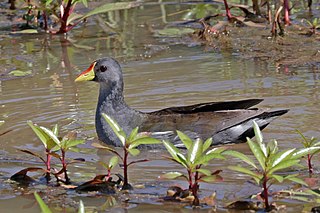
The lesser moorhen is a species of bird in the family Rallidae. It is sometimes placed into the genus Gallinula. It is the only member of the genus Paragallinula.
Poecilosomella brevisecunda is a species of fly belonging to the family Sphaeroceridae. It has only been recorded from Gunung Leuser National Park in northern Sumatra, Indonesia.

The angulate tortoise is a species of tortoise found in dry areas and coastal scrub vegetation in South Africa. It is the only living member of the genus Chersina.
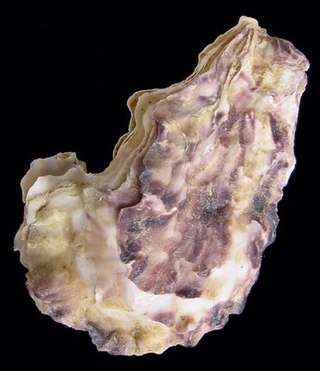
The Portuguese oyster is a species of oyster found in the southwest Iberian Peninsula, closely related to the Pacific oyster. Although first identified as a native European species, genetic studies have suggested the Portuguese oyster originated from the Pacific coast of Asia and was introduced to Europe by Portuguese trading ships in the 16th century. The species is usually found in coastal river mouths and estuaries.

Usta angulata, the angled emperor, is a species of moth in the family Saturniidae. It is found in Kenya, Tanzania, Somalia and Botswana.
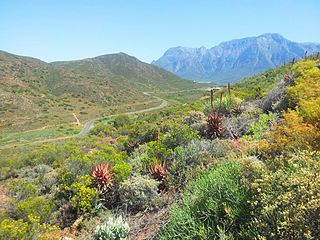
The Karoo Desert National Botanical Garden is a botanical garden focused on succulents and other plants of arid regions, that lies at the foot of the Hex River Mountains range, in the town of Worcester, South Africa.
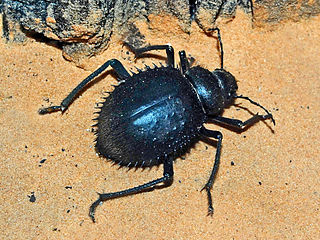
Pimelia angulata is a species of darkling beetles in the subfamily Pimeliinae.
Artaxa angulata is a moth of the family Erebidae first described by Shōnen Matsumura in 1927. It is found in Taiwan, Myanmar, India, Pakistan, Sri Lanka, Malaysia, Singapore and Indonesia.
Perigonica angulata is a species of cutworm or dart moth in the family Noctuidae. It is found in North America.

Paracapnia angulata, the angulate snowfly, is a species of small winter stonefly in the family Capniidae. It is found in North America. Its nymph is eaten by the steelhead trout.

Rhagonycha angulata is a species of soldier beetle in the family Cantharidae. It is found in North America.
Tritoma angulata is a species of pleasing fungus beetle in the family Erotylidae. It is found in North America.
Tachyta angulata is a species of ground beetle in the family Carabidae. It is found in North America.

Pyractomena angulata is a species of firefly in the family of beetles known as Lampyridae. It is found in North America and is the state insect of Indiana. It is also known as Say's firefly named after Thomas Say, and the angle candled firefly.
Xanthonia angulata is a species of leaf beetle. It is found in North America. It is associated with oaks. The specific name comes from the Latin angulatus, meaning "with angles".
Gargaphia angulata is a species of lace bug in the family Tingidae. It is found in North America.
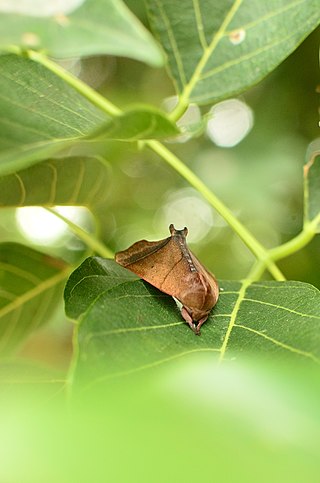
Carea angulata is a moth of the family Nolidae first described by Johan Christian Fabricius in 1793. It is found in India, Sri Lanka, China and Indonesia.
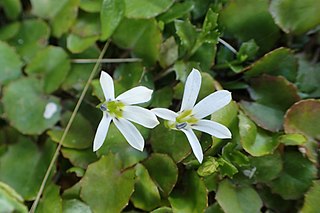
Lobelia angulata, previously known as Pratia angulata, and commonly known as pānakenake, or Lawn Lobelia is a small scrambling herbaceous plant native to New Zealand.













